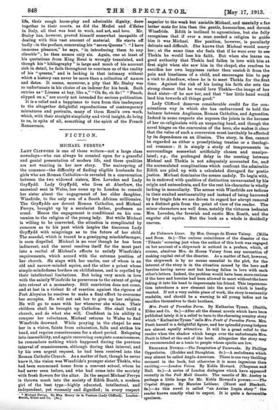FICTION.
MICHAEL FERRYS.*
LADY CLIFFORD is one of those writers—not a large class nowadays—who can always be counted upon for a graceful and genial presentation of modern life, and these qualities are not wanting in her new story. The mainspring of the romance—the difficulty of finding eligible husbands for girls who are Roman Catholics—is revealed in a conversation between the two widowed sisters, Mrs. Loveden and Lady Gryffydd. Lady Gryffydd, who lives at Aberfraw, the ancestral seat in Wales, has come up to London to consult her sister about the engagement of her elder daughter, Winefride, to the only son of a South African millionaire. The Gryffydds are devout Roman Catholics, and Michael Ferrys, brought up by a secularist father, professes no creed. Hence the engagement is conditional on his con- version to the religion of the young lady. But while Michael is willing to be converted, the situation is complicated by rumours as to his past which inspire the timorous Lady Gryffydd with misgivings as to the future of her child. The scandal, which is traced to a gossipping mischiefmonger, is soon dispelled. Michael is no road though he has been indiscreet, and the novel resolves itself for the most part into a recital of Michael's efforts to satisfy Winefride's requirements, which accord with the extreme position of her church. He stays with her uncles, one of whom is an old and narrow-minded squire, and the other a priest whose simple-mindedness borders on childishness, and is repelled by their intellectual limitations. But being very much in love with the saintly Winefride he perseveres to the extent of going into retreat at a monastery. Still conviction does not come, and at last in a violent fit of reaction against the rigours of Fort Aloysius he resolves to make a final effort to overcome her scruples. He will not ask her to give up her religion. He will go to mass with her whenever she wishes. Their children shall be brought up Catholics. She shall build a church, and do what she will. Confident in his ability to conquer her reluctance, Michael returns to Wales to find Winefride drowned. While praying in the chapel he sees her in a vision, faints from exhaustion, falls and strikes his bead, and regains consciousness for a short period. Relapsing into insensibility, and again recovering complete consciousness, be remembers nothing which happened during the previous
-interval of consciousness, although during that interval, and by his own urgent request, he had been received into the Roman Catholic Church. As a matter of fact, though he never .knew it, the vision was Winefride's younger sister Thekla, who
had been summoned home from a convent school, whom he had never seen before, and who had come into the sacristy with fresh flowers for the altar. In the sequel Michael Ferrys is thrown much into the society of Edith Roath, a modern girl of the best type—highly educated, intellectual, and independent, yet womanly and dignified ; in every respect
• Michael Ferrys. By Mrs. Henry de is Pasture (Lady Clifford). Loudon : Smith. Elder and Co. 163.1
superior to the weak but 'amiable Michael, and mentally a far better mate for him than the gentle, humourless, and devout, Winefride. Edith is inclined to agnosticism, but she fully recognizes that if ever a man needed a religion to guide him it was Michael. Her position, however, is peculiarly delicate and difficult. She knows that Michael would marry her; at the same time she feels that if he were ever to see• Thekla he would lose his faith. But when she learns on good authority that Thekla had fallen in love with him at first sight when she saw him in the chapel, she resolves te. sacrifice her own happiness rather than snatch it from the pain and loneliness of a child, and encourages him to pay a visit to Aberfraw, where he is to meet Thekla for the first time. Against the risk of his losing his faith she sets the strong chance that he would love Thekla—the image of bee dead sister—if he saw her, and that " her little hand would lead him towards all things good."
Lady Clifford deserves considerable credit for the con- scientious way in which she has endeavoured to hold the balance between Anglicans, Roman Catholics, and Agnostics. Indeed in some respects she exposes the joints in the harness of her co-religionists with an unsparing band, and though the novel hinges on the conversion of the hero, she makes it clear that the value of such a conversion must inevitably be affected' by its dependence on an illusion. The story, in fine, cannot; be regarded as either a proselytising treatise or a theologi- cal romance : it is simply a study of temperaments in, surroundings somewhat artificially chosen and manipu- lated ; e.g., the prolonged delay in the meeting between Michael and Thekla is not adequately accounted for•, and the accumulated complications which confront the admirable Edith are piled up with a calculated disregard for poetic, justice. Michael dominates the scenes unduly. To begin with, he is endowed with qualities of distinction unwarranted by his origin and antecedents, and for the rest his character is wholly lacking in masculinity. The scenes with Winefride are tedious in their exalted sentimentality and instead of being harrowed by her tragic fate we are driven to regard her abrupt removal! as a distinct gain from the point of view of the reader. The minor characters are well done, notably the virtuous hedonist Mrs. Loveden, the feverish and exotic Mrs. Reath, and the angular old squire. But the book as a whole is decidedly uneven.










































 Previous page
Previous page